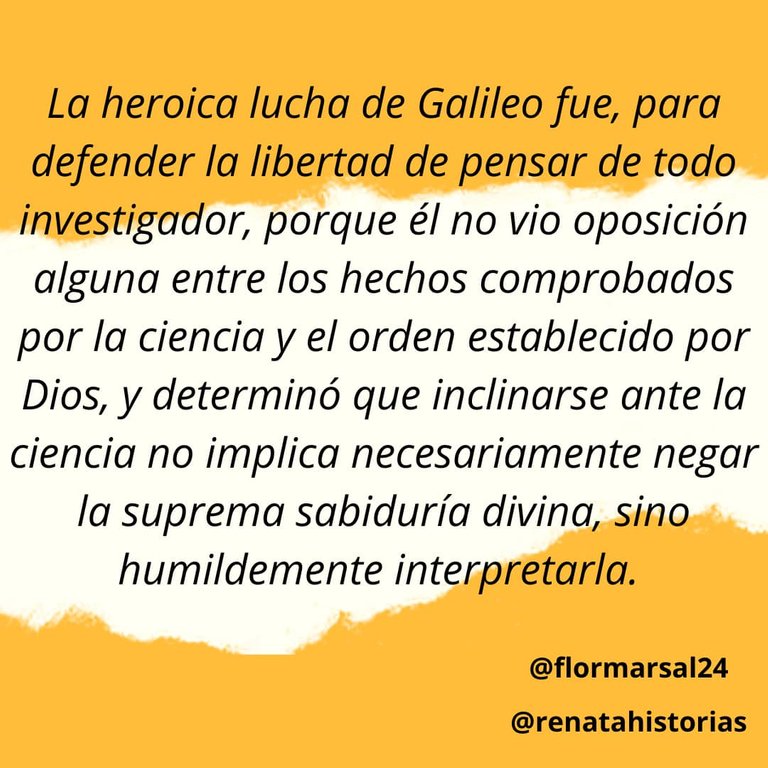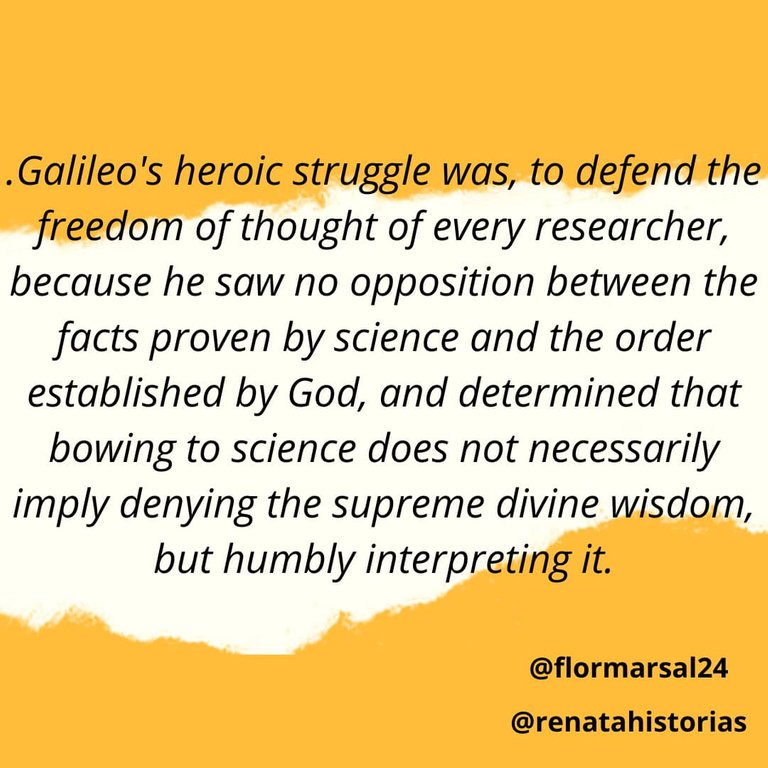Observador visionario, fundador de una nueva era y precursor de la ciencia moderna: Galileo Galilei. (III Parte: El ocaso del gran astrónomo.)

La imagen fue editada con CANVAS por el autor
Título: Observador visionario, fundador de una nueva era y precursor de la ciencia moderna: Galileo Galilei. (III Parte: El ocaso del gran astrónomo.)
Hasta ese tiempo se había afirmado que la Tierra permanecía quieta y el Sol y los demás planetas giraban en torno de la misma. Sin embargo, Copérnico había logrado demostrar que el Sol era el centro del sistema planetario y la Tierra y los planetas se movían alrededor de él. Galileo defendió las teorías de Copérnico, que se encontraban en oposición con ciertos principios sostenidos por la Iglesia.
Para el año 1613 publicó Cartas sobre las Manchas Solares, este libro atrajo la atención de la Iglesia por las diferencias entre la nueva opinión que exponía sobre el sistema solar y ciertos pasajes de la Sagrada Escritura. Galileo declaró en su libro que estaba de acuerdo con la teoría de Copérnico en el sentido de que el Sol permanecía inmóvil y que la Tierra giraba entorno suyo, ese apoyo le ganó una llamado de atención del papa.
En el año 1615, fue advertido de que debía especificar sus estudios y únicamente limitarse al campo de la ciencia, sin invadir el espacio de la teología. Para el año 1616, tuvo que prometer que no apoyaría, ni defendería, ni enseñaría la nueva teoría solar, coaccionado por las presiones y amenazas, se retiró a Florencia. Galielo continúo trabajando durante 16 años sin escribir nada que pudiera ofender a las autoridades, pero en 1632 publicó un libro cuyo contenido era una clara rebelión a lo que había prometido casi dos décadas antes. Ese libro atrajo la atención de toda Europa, hasta la prohibición de su venta; después de ello, Galileo fue llamado a Roma por el Tribunal de la Inquisición.
Sometido a examen, y bajo amenazas de torturas, el 21 de junio de 1633, se le exigió a Galileo Galilei negar sus creencias, viéndose obligado afirmar, pese a sus íntimas convicciones que todo lo que sostuvo durante su vida y el apoyo a las teorías de Copérnico no eran ciertas, no obstante se asegura que Galileo en voz baja afirmó: “Eppur si mouve” (“Y sin embargo, se mueve”), haciendo referencia a la Tierra y que aún permanecía firme en sus creencias internas.
La heroica lucha sostenida por Galileo, fue por defender la libertad de pensar de todo investigador, porque él no vio oposición alguna entre los hechos comprobados por la ciencia y el orden establecido por Dios, y determinó que inclinarse ante la ciencia no implicaba necesariamente negar la suprema sabiduría divina, sino intentar humildemente interpretarla.
Galileo vivió en paz sus últimos años de vida, trabajando en Florencia; aun cuando se encontraba afectado por la sordera y casi ciego, realizó nuevos descubrimientos hasta su muerte en el año 1642.
“Y sin embargo se mueve”, será siempre el símbolo y la manifestación del espíritu libre del ser humano, en su eterna y constante búsqueda por hallar la verdad.

La imagen fue editada con CANVAS por el autor
Title: Visionary observer, founder of a new era and forerunner of moderna science: Galileo Galilei. (Part III: The Twilight of the great astronomer.)
Until that time it had been claimed that the Earth remained still and the Sun and the other planets revolved around it. However, Copernicus had managed to prove that the Sun was the center of the planetary system and the Earth and the planets moved around it. Galileo defended the theories of Copernicus, which were in opposition to certain principles held by the Church.
By the year 1613 he published Letters on Sunspots, this book attracted the attention of the Church because of the differences between the new opinion it expounded on the solar system and certain passages of Holy Scripture. Galileo stated in his book that he agreed with Copernicus' theory that the Sun remained motionless and that the Earth revolved around him, this support earned him a call for attention from the pope.
In the year 1615, he was warned that he should specify his studies and limit himself only to the field of science, without invading the space of theology. By the year 1616, he had to promise that he would neither support, defend, nor teach the new solar theory, coerced by pressures and threats, he retired to Florence. Galielo continued to work for 16 years without writing anything that could offend the authorities, but in 1632 he published a book whose content was a clear rebellion to what he had promised almost two decades earlier. That book attracted the attention of all of Europe, until the prohibition of its sale; after that, Galileo was summoned to Rome by the Court of the Inquisition.
Subjected to examination, and under threats of torture, on June 21, 1633, Galileo Galilei was required to deny his beliefs, being forced to affirm, despite his intimate convictions that everything he maintained during his life and the support for the theories of Copernicus were not true, however it is assured that Galileo quietly affirmed: “Eppur si mouve” (“And yet, it moves”), referring to the Earth and that he still remained firm in his internal beliefs.
The heroic struggle sustained by Galileo was to defend the freedom of thought of every researcher, because he saw no opposition between the facts proven by science and the order established by God, and determined that bowing to science did not necessarily imply denying the supreme divine wisdom, but humbly trying to interpret it.
Galileo lived his last years of life in peace, working in Florence; although he was affected by deafness and almost blind, he made new discoveries until his death in 1642.
“And yet it moves”, will always be the symbol and manifestation of the free spirit of the human being, in his eternal and constant search to find the truth.
Para mí, Galileo siempre será un señor digno de admirar. A pesar de las amenazas de la Iglesia, siguió trabajando con la firme convicción de que su contribución no ofendía a nadie, y que los llamados de atención de la Iglesia era más que nada motivado por el temor de ésta de perder influencia sobre la gente, como sucedería siglos después. Excelente artículo, @flormarsal . ¡Saludos!